 |
View as a two-column galley proof
View as a feature
The Real Butch Cassidy and His Wild Bunch
by Jay Robert Nash
Butch Cassidy and his Wild Bunch members were the last of the old-time western bank and train robbers, a colorful group of outlaws with distinctive personalities and a flair for the flamboyant. Cassidy was no mean-minded desperado, but a fun-loving, easy-going bandit, who preferred to use his brains rather than his six-gun. He was backed up in most of his gun play by the fast-draw gunman, Sundance Kid. Both died bloody thousands of miles from the American West that spawned them. Or did they?
Cassidy's gang members included Will "News" Carver, addicted to reading press notices about the gang; Ben Kilpatrick, the towering bandit known as the Tall Texan; and the most deadly of the group, Harvey Logan, who was also known as Kid Curry. Born Robert Leroy Parker in Beaver, Utah, on April 13, 1866, Cassidy was one of ten children and had no formal education. He became a cowboy while in his teens when he met outlaw Mike Cassidy, adopting Cassidy's name after he joined him in rustling cattle in Utah and Colorado. He got the nickname "Butch" after working briefly as a butcher.
 |
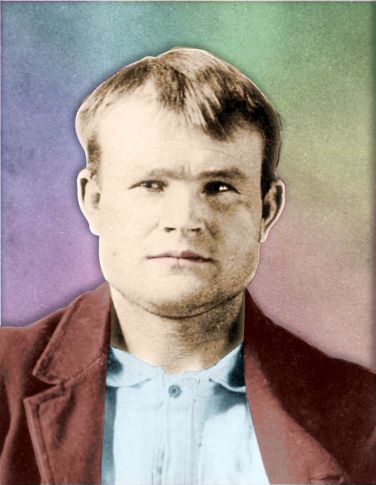 |
| Butch Cassidy (George Leroy Parker), an affable robber, who, with his Wild Bunch bandits, made up the last great outlaw gang of the Old West. |
Cassidy taught Butch how to shoot so that he was able to hit a playing card dead center at fifty paces and his draw was much faster than historians later described. Mike Cassidy led a small band of robbers and rustlers but, after he shot a Wyoming rancher, he disappeared. Butch took over the gang, its hideout at Robber's Roost, located in the southwest mountainous corner of Utah.
The fact that Cassidy was far from being a bloodthirsty bandit was demonstrated early in his criminal career. On November 3, 1887 Cassidy, Tom and Bill McCarty, and Matt Warner stopped the Denver and Rio Grande express near Grand Junction, Colorado. The stubborn express guard refused to open the safe in the mail car and Bill McCarty put a six-gun to his head. "Should we kill him?" he asked.
"Let's vote," Cassidy said.
 |
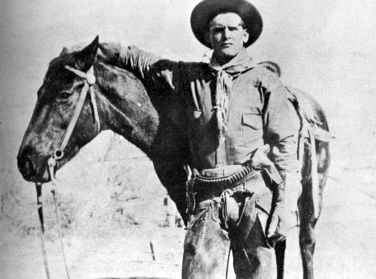 |
| Butch Cassidy when he worked as a cowboy while robbing banks on the side. |
Butch persuaded gang members not to kill the guard and the train moved off, leaving the bandits with nothing. Cassidy briefly abandoned robbery and went back to rustling and work as a cowboy or a miner in the Colorado and Utah mines. This proved to be his routine over the next decade, committing robberies, and then returning to jobs, chiefly as a cowboy. He learned early not to bring attention to himself by openly spending stolen loot.
 |
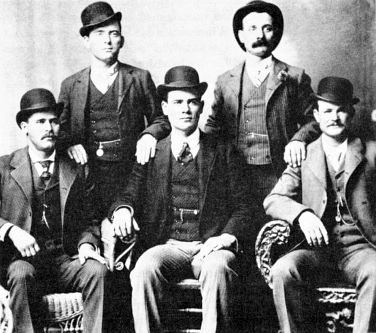 |
| Wild Bunch members posing for posterity: (standing, left to right) William "News" Carver, Harvey "Kid Curry" Logan (sitting, left to right), Harry "Sundance Kid" Longbaugh (Harry Alonzo Longbaugh, or Longabaugh; 1867-1908), Ben "Tall Texan" Kilpatrick, and the inimitable Butch Cassidy. |
When he formed the Wild Bunch years later, Cassidy lectured his fellow bandits, giving what might be termed "lessons in committing successful crimes." He detailed the mistakes he and others had made which resulted in imprisonment or death. He talked about how the McCarty brothers had been shot to pieces in Delta, Colorado, on September 27, 1893, after they attempted to rob the bank there without first learning the strength of local lawmen. He described how Matt Warner had been captured and sent to prison by giving himself away to tracking sheriffs.
Cassidy warned his fellow bandits that it was no good to merely ride into a town and rob the bank unless the town was scouted ("cased") and learn whether or not a local vigilante group existed, or the strength of the local sheriff's force, and chiefly, how much money was really in the bank. Usually, he pointed out, such information could be easily learned by merely visiting the bank in advance and asking a few questions of its employees.
 |
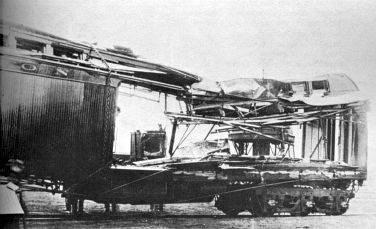 |
| An express car blown to pieces during the train robbery committed by Cassidy and other bandits at Wilcox, Wyoming, June 2, 1899; the guard, a defiant man named Woodcock, was almost killed when Butch set off the dynamite, which had been placed at the door of the car. |
The outlaw's macabre humor was evidenced when he robbed the First National Bank of Denver of $20,000 on March 30, 1889. Cassidy had scouted that bank and knew how much money was in its safe. At that time, Cassidy approached the bank president and stated: "Excuse me, sir, but I just overheard a plot to rob this bank."
The bank president trembled, saying: "Lord! How did you learn of this plot?"
"I planned it," Cassidy said, pulling his six-gun. "Put up your hands."
 |
 |
| The relentless posse that set out after Cassidy and the Wild Bunch after their train robbery at Tipton, Wyoming on August 29, 1900: (identified by numbers, left to right) 1) George Hiatt; 2) T. T. Kelliher; 3) Joe Lefors, the lawman the Wild Bunch most feared; 4) H. Davis; 5) Si Funk; 6) Jeff Carr. |
When his hideouts became known to lawmen, Cassidy moved his gang to Hole-in-the-Wall, which was located in Colorado and Wyoming, more of a fortress than Cassidy's old Utah haven, Robber's Roost. Throughout the 1890s, Butch and the Wild Bunch successfully robbed banks and trains, but the railroads and banks hired the most efficient lawmen of the day to relentlessly hunt them down. Bill Carver and Ben Kilpatrick were caught and imprisoned. Harvey Logan, the notorious Kid Curry, was trapped by a posse, and, rather than be captured, killed himself by sending a bullet into his brain.
 |
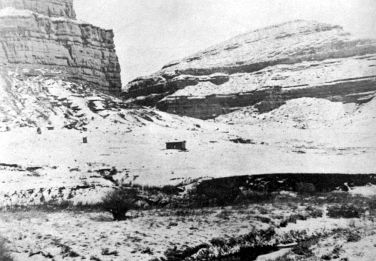 |
| Hole in the Wall, the natural fortress surrounded by mountains at the Colorado-Wyoming border where Cassidy and the Wild Bunch routinely took refuge. |
By the early 1900s, Cassidy realized that the Old West he knew was too hot to hold him. He convinced the Sundance Kid (Harry Longbaugh or Longabaugh) to depart for safer pastures. Sundance had by then taken up with Etta Place, a beautiful teacher longing for adventure. She accompanied Sundance and Cassidy when they traveled to New York and then to Bolivia where Butch and Sundance worked as miners while also robbing local banks.
 |
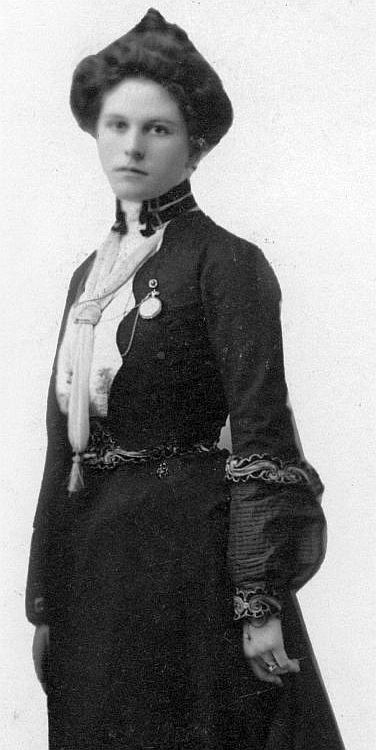 |
| The beautiful and mysterious Etta Place, Sundance Kid's lover, who went with him and Cassidy to South America, but left the outlaws after deciding they would meet violent ends. |
Etta, fearful that she would eventually see her lover, Sundance, killed by Bolivian lawmen, decided to leave the outlaws and returned to the U.S., changing her name and disappearing. Butch and Sundance, however, continued their errant ways. In early 1908, they robbed a Bolivian payroll in Aramayo, which caused police and federal troops to hunt them throughout the country. They were finally trapped in the small village of San Vicente on November 6, 1908. Both were killed after a terrific gun battle.
 |
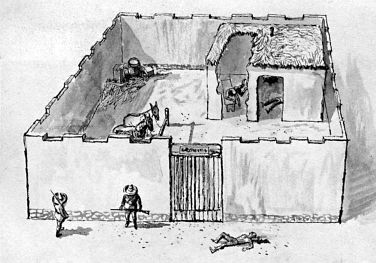 |
| San Vicente, Bolivia, November 6, 1908: Inside the small hut at top are sprawled two bodies, Butch Cassidy and Sundance Kid, killed after a wild shootout with Bolivian police and federal troops. Some reports claim Butch survived, escaped and returned to the U.S., living into old age. |
Several reports claim that Cassidy survived and escaped, returning to his birthplace of Circleville, Utah, living under an alias and dying in 1929. Another report insists that he moved to Johnnie, Nevada, and lived there until 1937. Still, another tale claims that he survived until 1943 or 1944, dying in either California or Washington. All of these claims, mythical or real, would have delighted the capricious Butch, who once said to Sundance: "If you want to escape, you must confuse everybody!"
View as a two-column galley proof
View as a feature
|
 |